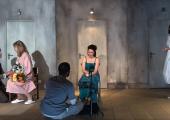Road, Royal Court review - poetry amidst the pain

John Tiffany leads Jim Cartwright's debut play towards the sublime
Who'd have guessed that the London theatre scene at present would be so devoted to the numinous? Hard on the heels of Girl from the North Country, which locates moments of transcendence in hard-scrabble Depression-era lives, along comes John Tiffany's deeply tender revival of Jim Cartwright's vaunted 1986 play Road, which tempers its landscape of pain with an abundance of poetry.









